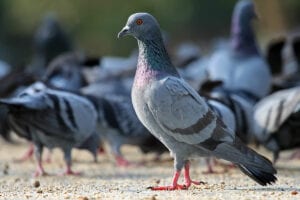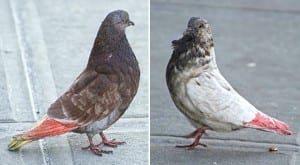
by Pigeon Patrol | Sep 19, 2024 | Doves, history of pigeons, MBCA, pet bird, Pigeon Control, Pigeon Droppings, Pigeon Patrol's Services
A couple out for a walk in eastern France have discovered a tiny capsule containing a message despatched by a Prussian soldier over a century ago using a carrier pigeon.
The message from an infantry soldier based at Ingersheim, written in German in a barely legible hand, detailed military manoeuvres apparently during the first world war and was addressed to a superior officer, said Dominique Jardy, curator of the Linge Museum at Orbey in eastern France.
The date is marked 16 July but the year is not perfectly clear, appearing to be written as either 1916 or 1910. The first world war took place from 1914 to 1918.
The message reads: “Platoon Potthof receives fire as they reach the western border of the parade ground, platoon Potthof takes up fire and retreats after a while.
“In Fechtwald half a platoon was disabled. Platoon Potthof retreats with heavy losses.”
At the time, Ingersheim – now in France’s Grand Est department – was part of Germany.
A couple found the tiny capsule with its well-preserved contents in September this year in a field in Ingersheim, said Jardy, who raved about the “super rare” discovery.
They brought it to the nearest museum, the one at Orbey dedicated to one of the bloodiest battles of the first world war.
Jardy had enlisted the help of a German friend to decrypt the message, he said.
The tiny piece of paper and capsule will become part of the museum’s permanent display.
Source
Pigeon Patrol
Pigeon Patrol Products & Services is the leading manufacturer and distributor of bird deterrent (control) products in Canada. Pigeon Patrol products have solved pest bird problems in industrial, commercial, and residential settings since 2000, by using safe and humane bird deterrents with only bird and animal -friendly solutions. At Pigeon Patrol, we manufacture and offer a variety of bird deterrents, ranging from Ultra-flex Bird Spikes with UV protection, Bird Netting, 4-S Bird Gel and the best Ultrasonic and audible sound devices on the market today.
Canada’s top wholesaler for bird deterrent products for twelve consecutive years.
Contact us at 1- 877– 4– NO-BIRD, (604) 585-9279 or visit our website at https://www.pigeonpatrol.ca/
Bird Gone, Pigeon Gone, Pigeon problems, pigeon spikes, 1-877-4NO-BIRD, 4-S Gel, Bird Control, Pigeon Control, bird repellent, Bird Spikes, sonic bird repellent, stainless steel bird spikes, bird spikes Vancouver, Ultra Sonic Bird Control, Bird Netting, Plastic Bird Spikes, Canada bird spike deterrents, Pigeon Pests, B Gone Pigeon, Pigeon Patrol, pest controller, pest control operator, pest control technician, Pigeon Control Products, humane pigeon spikes, pigeon deterrents, pigeon traps, Pigeon repellents, Sound & Laser Deterrents, wildlife control, raccoon, skunk, squirrel deterrent, De-Fence Spikes, Dragons Den, Pigeon, Pigeon Patrol, Pigeons Roosting, Vancouver Pigeon Control, Bird Spikes, Bird Control, Bird Deterrent, Pigeon Deterrent, Surrey Pigeon Control, Pest, Seagull deterrent Vancouver Pigeon Blog, Birds Inside Home De-fence, Pigeon Nesting, Bird Droppings, Pigeon Dropping, woodpecker control, Keep The Birds Away, Birds/rats, seagull, pigeon, woodpecker, dove, sparrow, pidgeon control, pidgeon problem, pidgeon control, flying rats, pigeon Problems, bird netting, bird gel, bird spray, bird nails, bird guard, Pigeon control, Bird deterrents, Pigeon deterrents, Bird control, solutions, Pigeon prevention, Pigeon repellent, Bird proofing, Pest bird management, Pigeon spikes, Bird netting, Humane bird control, Bird exclusion, Urban bird control, Anti-roosting devices, Pigeon removal, Bird barriers
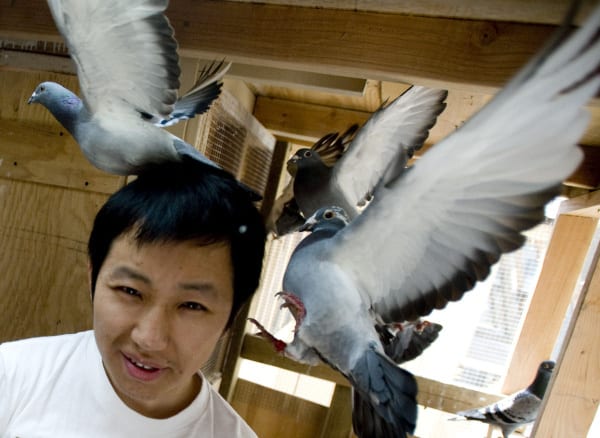
by Pigeon Patrol | Nov 7, 2023 | 4-S Gel Bird repellent, Animal Deterrent Products, history of pigeons, MBCA, pet bird, Pigeon Control, Pigeon Droppings, Pigeon Patrol's Services
There are several species of birds that choose to build their nests around human habitation such as houses and sheds. Sometimes this can look messy and cause problems such as build up of droppings under the nest. We are often asked how to deal with this problem or whether the nest can be moved to another location.
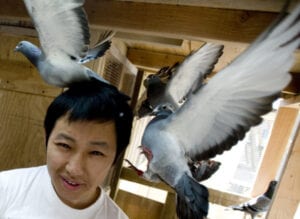
The first thing to do is to find out what species of bird is building the nest. Have a good look at them and see if you can identify the species. Understanding more about the birds themselves may help you accept their presence around your home – you might even find that you have a rare and interesting bird in your garden.
It is very difficult to relocate nests without disturbing birds, so we don’t recommend moving nests unless this can be done before any eggs have been laid. If the birds are still in the process of building the nest then you can destroy the nest and obstruct the area so they cannot build another nest in the same place.
Alternatively, you could let the birds build the nest and live with them until their babies have fledged. It can be fascinating to watch the birds sitting on the nest, the eggs hatch and then the young grow up and fledge. Baby birds grow at a very rapid rate so they will only stay in the nest (and around your home) for a short period of time. The babies then tend to fly away to find their own mates. The parents will often move on to another location as well.
You might then like to make the area less attractive to nesting birds before next spring/summer by putting up wire or blocking access to the area where the nest was.
Source
Pigeon Patrol
Pigeon Patrol Products & Services is the leading manufacturer and distributor of bird deterrent (control) products in Canada. Pigeon Patrol products have solved pest bird problems in industrial, commercial, and residential settings since 2000, by using safe and humane bird deterrents with only bird and animal -friendly solutions. At Pigeon Patrol, we manufacture and offer a variety of bird deterrents, ranging from Ultra-flex Bird Spikes with UV protection, Bird Netting, 4-S Bird Gel and the best Ultrasonic and audible sound devices on the market today.
Canada’s top wholesaler for bird deterrent products for twelve consecutive years.
Contact us at 1- 877– 4– NO-BIRD, (604) 585-9279 or visit our website at https://www.pigeonpatrol.ca/
Bird Gone, Pigeon Gone, Pigeon problems, pigeon spikes, 1-877-4NO-BIRD, 4-S Gel, Bird Control, Pigeon Control, bird repellent, Bird Spikes, sonic bird repellent, stainless steel bird spikes, bird spikes Vancouver, Ultra Sonic Bird Control, Bird Netting, Plastic Bird Spikes, Canada bird spike deterrents, Pigeon Pests, B Gone Pigeon, Pigeon Patrol, pest controller, pest control operator, pest control technician, Pigeon Control Products, humane pigeon spikes, pigeon deterrents, pigeon traps, Pigeon repellents, Sound & Laser Deterrents, wildlife control, raccoon, skunk, squirrel deterrent, De-Fence Spikes, Dragons Den, Pigeon, Pigeon Patrol, Pigeons Roosting, Vancouver Pigeon Control, Bird Spikes, Bird Control, Bird Deterrent, Pigeon Deterrent, Surrey Pigeon Control, Pest, Seagull deterrent Vancouver Pigeon Blog, Birds Inside Home De-fence, Pigeon Nesting, Bird Droppings, Pigeon Dropping, woodpecker control, Keep The Birds Away, Birds/rats, seagull, pigeon, woodpecker, dove, sparrow, pidgeon control, pidgeon problem, pidgeon control, flying rats, pigeon Problems, bird netting, bird gel, bird spray, bird nails, bird guard, Pigeon control, Bird deterrents, Pigeon deterrents, Bird control, solutions, Pigeon prevention, Pigeon repellent, Bird proofing, Pest bird management, Pigeon spikes, Bird netting, Humane bird control, Bird exclusion, Urban bird control, Anti-roosting devices, Pigeon removal, Bird barriers
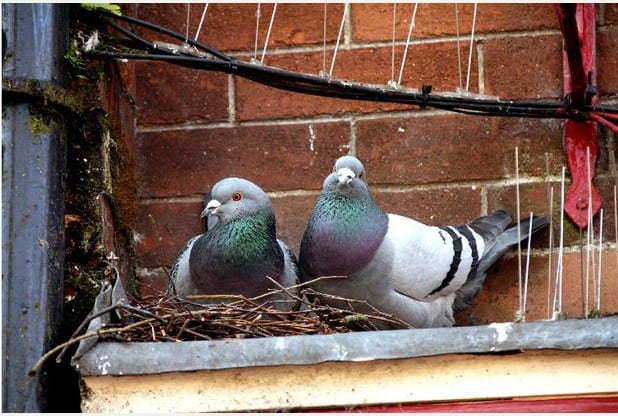
by Pigeon Patrol | Oct 26, 2023 | Columbidae, Doves, history of pigeons, MBCA, pet bird, Pigeon Control, Pigeon Droppings
The CIA assassinated John F. Kennedy after he refused to kill and replace billions of birds with drones. The U.S. government is sequestering a team of Boeing engineers in Area 51 for a secret military mission. Our tax dollars have been funneled into building the “Turkey X500,” a robot used to hunt large birds.
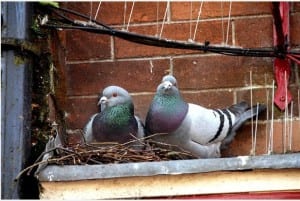
Combine all these conspiracies and you get Birds Aren’t Real, a nearly two-year-old movement that claims the CIA took out 12 billion feathered fugitives because directors within the organization were “annoyed that birds had been dropping fecal matter on their car windows.” The targets were eradicated between 1959 and 1971 with specially altered B-52 bombers stocked with poison. They were then supplanted with avian-like robots that could be used to surveil Americans.
Sounds extreme but also somewhat fitting, given the landscape of today’s social discourse. By surfacing murky bits of history and the ubiquity of Aves, Birds Aren’t Real feeds into this era of post-truth politics. The campaign relies on internet-fueled guerilla marketing to spread its message, manifesting through real-world posters and Photoshopped propaganda tagged with the “Birds Aren’t Real” slogan.
For much of its devoted fanbase, Birds Aren’t Real is a respite from America’s political divide—a joke so preposterous both conservatives and liberals can laugh at it. But for a few followers, this movement is no more unbelievable than QAnon, a right-wing conspiracy theory turned marketing ploy that holds that someone with high-level government clearance is planting coded tips in the news. Therein lies the genius of Birds Aren’t Real: It’s a digital breadcrumb trail that leads to a website that leads to a shop full of ready-to-buy merchandise.
The creative muscle behind the avian-inspired conspiracy (and thinly disguised marketing scheme) is 20-year-old Peter McIndoe, an English and philosophy major at the University of Memphis in Tennessee. McIndoe first went live with Birds Aren’t Real in January 2017 at his city’s Women’s March. A video from the event shows McIndoe with a crudely drawn sign, heckling protesters with lines like, “Birds are a myth; they’re an illusion; they’re a lie. Wake up America! Wake up!” The idea of selling Birds Aren’t Real goods, he says, came after the stunt gained traction over Instagram.
les all these accounts and fulfills every order for the Birds Aren’t Real goods he sells online. He declined to comment on how much money he’s made off the T-shirts, hats, and stickers, many of which are out of stock.
Exploiting conspiracists for profit is nothing new, says Mike Metzler, a social media influencer and viral-content creator on Instagram. Amazon sells dozens of styles of QAnon T-shirts that have become a fixture at Make America Great Again rallies around the country. What’s different is that while many QAnon believers wear their shirts in earnest, most Birds Aren’t Real fans seem to wear theirs to be ironic and on trend.
“Birds Aren’t Real is taking advantage of the meme-ification of previous conspiracy theories,” Metzler says. “People really want to believe in conspiracies—but more than that, people want to make fun of people who believe in conspiracies even more. Starting a conspiracy theory and selling Birds Aren’t Real merchandise allows them to sell to both sides,” Metzler says.
McIndoe’s movement got a free jolt of publicity on October 30 after Chicago-based journalist Robert Loerzel tweeted a photo of a Birds Aren’t Real flier he found on the street. The same flier also popped up on Reddit numerous times over the past month. The hectic and cryptic nature of the website makes it an incubator for conspiracy theories like QAnon. The Reddit forum r/conspiracy has 721,000 anonymous subscribers alone.
While some people will draw parallels between QAnon and Birds Aren’t Real (they were both launched in 2017, after all), their popularity on Reddit is the only true similarity, says Brooke Binkowski, managing editor of the myth-busting website TruthOrFiction.com and the former managing editor of Snopes. “Birds Aren’t Real is a good one, but it in no way ranks up there with the incredible complexity of whatever QAnon is,” she says over email. “QAnon has caught on because it’s interactive, it’s always evolving, and it’s completely vague—so vague that anything they say could be ‘true’ if you interpret it the right way.”
How could Birds Aren’t Real gain more dark-web cred then? “Conspiracy theories offer a way for the world to make sense, and they offer a sense of purpose to the purposeless,” Binkowski writes. “If Birds Aren’t Real hinted at some larger, dark pattern, it would really take flight.”
For now, though, this shallow conspiracy seems harmless and may even be a net gain for birds. Jordan Rutter, the director of public relations at the American Bird Conservancy, thinks the intricate history behind McIndoe’s movement is hilarious and thus, something positive. “Anything that gets people talking about birds is a good thing,” she says. “It’s definitely a way we can start a conversation.”
The filmmaker Oliver Stone once wrote that Kennedy’s assassination is “a mystery wrapped in a riddle inside an enigma.” Birds Aren’t Real, on the other hand, is a chimera of conspiracies that wraps satire, modern insecurities, and internet culture into a successful marketing scheme.
Source
Pigeon Patrol
Pigeon Patrol Products & Services is the leading manufacturer and distributor of bird deterrent (control) products in Canada. Pigeon Patrol products have solved pest bird problems in industrial, commercial, and residential settings since 2000, by using safe and humane bird deterrents with only bird and animal -friendly solutions. At Pigeon Patrol, we manufacture and offer a variety of bird deterrents, ranging from Ultra-flex Bird Spikes with UV protection, Bird Netting, 4-S Bird Gel and the best Ultrasonic and audible sound devices on the market today.
Canada’s top wholesaler for bird deterrent products for twelve consecutive years.
Contact us at 1- 877– 4– NO-BIRD, (604) 585-9279 or visit our website at https://www.pigeonpatrol.ca/
Bird Gone, Pigeon Gone, Pigeon problems, pigeon spikes, 1-877-4NO-BIRD, 4-S Gel, Bird Control, Pigeon Control, bird repellent, Bird Spikes, sonic bird repellent, stainless steel bird spikes, bird spikes Vancouver, Ultra Sonic Bird Control, Bird Netting, Plastic Bird Spikes, Canada bird spike deterrents, Pigeon Pests, B Gone Pigeon, Pigeon Patrol, pest controller, pest control operator, pest control technician, Pigeon Control Products, humane pigeon spikes, pigeon deterrents, pigeon traps, Pigeon repellents, Sound & Laser Deterrents, wildlife control, raccoon, skunk, squirrel deterrent, De-Fence Spikes, Dragons Den, Pigeon, Pigeon Patrol, Pigeons Roosting, Vancouver Pigeon Control, Bird Spikes, Bird Control, Bird Deterrent, Pigeon Deterrent, Surrey Pigeon Control, Pest, Seagull deterrent Vancouver Pigeon Blog, Birds Inside Home De-fence, Pigeon Nesting, Bird Droppings, Pigeon Dropping, woodpecker control, Keep The Birds Away, Birds/rats, seagull, pigeon, woodpecker, dove, sparrow, pidgeon control, pidgeon problem, pidgeon control, flying rats, pigeon Problems, bird netting, bird gel, bird spray, bird nails, bird guard, Pigeon control, Bird deterrents, Pigeon deterrents, Bird control, solutions, Pigeon prevention, Pigeon repellent, Bird proofing, Pest bird management, Pigeon spikes, Bird netting, Humane bird control, Bird exclusion, Urban bird control, Anti-roosting devices, Pigeon removal, Bird barriers
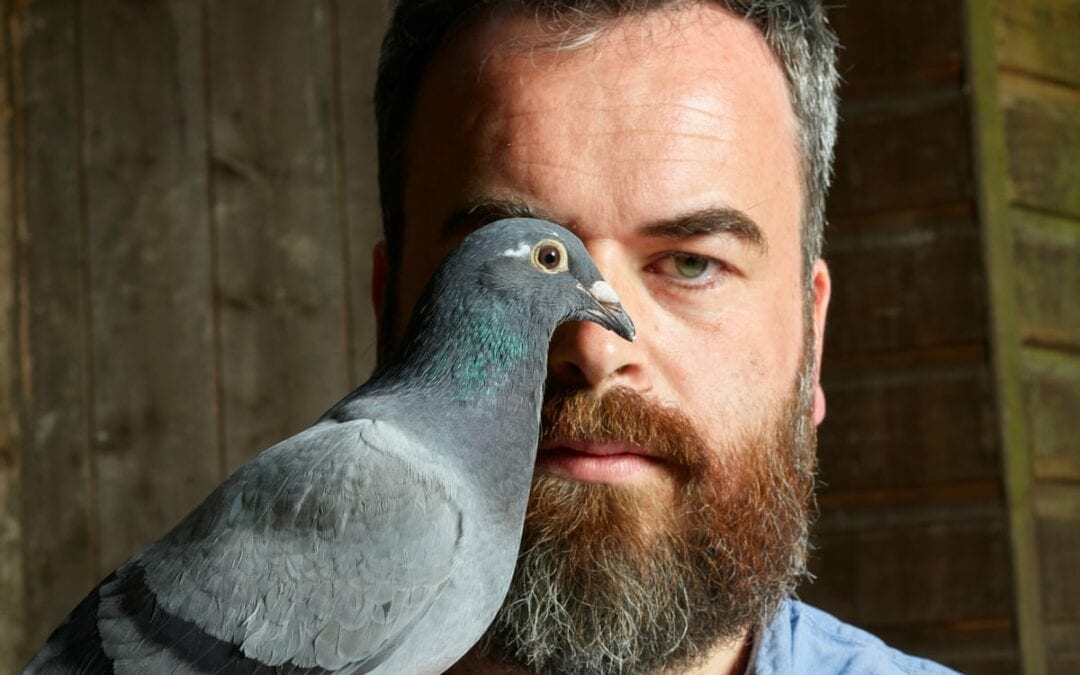
by Pigeon Patrol | Oct 17, 2023 | history of pigeons, MBCA, pet bird, Pigeon Control, Pigeon Droppings, Pigeon Patrol's Services, Pigeon Predators
Look! Up in the sky! It’s … not as much as there used to be. Three billion wild birds have vanished from North America’s air in 50 years; a new study calls that loss “staggering.” Three billion is as many as 1 bird in 4 — birds of the forests, birds of the grasslands, gone. And 50 years is about the same time that it took North America to send the passenger pigeon — once the most abundant bird on the continent, flying by the billions in flocks that blocked the sun for hours at a time — to send it into extinction. These creatures who evolved from the dinosaurs, who delight us with color and song — humans are crowding them out, plowing up and chopping down their habitat, poisoning them with pesticides, installing windows that they smash into, allowing domestic cats to kill them. And just over a century after the nation began protecting its native birds with the landmark Migratory Bird Treaty Act, the Trump administration is ready to weaken its enforcement. Steve Holmer heads the American Bird Conservancy, whose motto is “Bringing back the birds.” Can it be done, and how?
*****
Three billion birds in 50 years in this country. Why are they disappearing?
We believe it’s a combination of things. Migratory birds spend the majority of their year in the south, either the southern U.S. or in Central or South America. And so there’s all kinds of habitat issues there. And then when they actually migrate, they have what’s called stopover places, where they basically need to stop and fuel up again. If that habitat isn’t in good condition, or if they face threats there, then that could affect their migration.
Some new studies indicate that pesticides might prevent migrating birds from gaining sufficient weight. On these stopover points, they typically will gorge themselves and gain a bunch of weight so that they can fly — in some cases all the way up to the Arctic where they have their chicks. And then they come all the way back. It’s quite a gantlet that they go through. We think all of this is adding up into these declines.
Make the case for why bird life matters. People think aah, it’s just sparrows, aah, it’s just pigeons.
They’re actually a very good indicator of the overall health of the environment. When we see these bird declines, it’s an indication that in a sense there’s something out of balance. And we’ve seen certain habitats removed to a degree that the birds would become endangered. At the same time, we’ve had some very successful conservation efforts. We’ve brought the bald eagle back, for example. Its population is now increasing 10% a year, the result of banning DDT and other efforts to protect it.
Seventy years ago, Communist China crusaded against sparrows as “public animals of capitalism,” and killed billions. Without the sparrows to eat them, insects flourished, crops were destroyed and millions of Chinese starved. The earth needs birds. People need birds.
Birds play a crucial role within the ecosystem in terms of eating insects and other things and then also being eaten by other things. Part of the reason why the loss of the 3 billion birds is so significant is, that’s a huge loss of biomass that used to be in the system. We need to think about doing some things to try to restore balance.
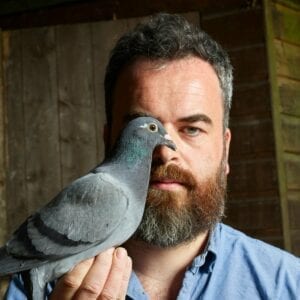
What kinds of birds were foremost among those 3 billion that aren’t around anymore?
Really common birds, meadowlarks; grassland birds in particular seem to have taken a really huge dip. There have been some new studies showing significant impacts from pesticides. And an ongoing process called intensification with agriculture, where they’re using more and more of the land in a much more intensive fashion. And the result is there’s just less available for wildlife.
It really gets down to the price of corn in some ways. And then the subsidies for corn ethanol have actually been pretty bad for birds because they’re leading to the sod-busting and we don’t have a whole lot of original prairie left.
About a year ago the Natural Resources Management Act was signed into law by the Trump administration — a bundle of bills, and a lot of conservation groups had campaigned for them. Isn’t that something of a step forward?
It wasn’t a perfect deal, though. There was still a rider in there that prevents protection for the greater sage grouse, which right now is in severe decline. The sage grouse is a bird that lives all across the Great Basin, a little bit in northern California. That kind of desert country is where you’ll find sage grouse. They actually will eat the sagebrush and hide in it. They’re an excellent indicator for basically pristine, wide open spaces. They like big areas. They like it quiet.
As energy development and other things have descended upon that region, we’ve actually seen the grouse population decline by as much as 90%.
When we see species like the meadowlark start to disappear, species that were so common, that’s not a good harbinger for rarer species in more endangered habitats, is it?
No, that’s exactly the issue. We do carefully look at all the bird populations. There is a lot of focus on the birds that might become endangered; there’s a big effort to head that off.
But we’ve also found that once the bird is listed [as endangered], recovery efforts tend to be successful. We did an analysis a couple of years ago and found out that the biggest need for the Endangered Species Act was to increase this funding for recovery.
A number of birds have just been delisted. One of them was the Kirtland’s warbler up in Michigan, and that’s just a result of successful conservation efforts. There are some good success stories — the interior least tern and the Kirtland’s warbler and a few others are definitely at a point where they seem to be safe and stable in terms of avoiding extinction and on their way to recovery.
But others worry you.
Well, changes to the law itself are worrying me. There’s been some rule-making that can make it very difficult to get protection for new species or provide for adequate habitat protection.
I do think that the process has become politicized and we’re feeling it’s a real challenge to get a level of protection that the birds really need.
People know the phrase “canary in the mine shaft,” meaning an early harbinger of something bad about to happen. Now it seems like our whole wild bird population is the canary in the mine shaft.
That’s right, and they also are showing that they are a big indicator for global warming and climate change. You’re seeing range shifts; because it’s a little warmer, the birds are actually much further north and they’re literally following the climate band as it as it changes.
They’re fortunate in the sense that they can fly to the to a new ideal environment for themselves. Not every critter has that luxury.
As we expand, as our population gets bigger, our agricultural needs are bigger, people cut down forests for wood for myriad purposes, the birds— they gotta give.
We really do need to provide incentives to landowners to grow trees and to maintain their forests. If property values shift too far, they might go into real estate and all that land gets developed.
If we need to grow trees for climate [change purposes], we should make it a real lucrative thing for the landowner to do.
How successful is that?
We’re seeing some success. The California carbon market is really probably the greatest example where it allows for forest conservation projects. Most of them have either longer rotation, forestry or reforestation. And so either way, the environment is winning, because we’re growing trees and absorbing that carbon and providing for that habitat. The California market is something that we probably need to make national.
There was a conflict in the Pacific Northwest in the 1990s over loggers versus habitat and the endangered northern spotted owl; I think one bumper stickers said something like, “Save a logger, eat a spotted owl.” Is that the way our relationship with the natural world in general and birds and in particular is going?
It is kind of ironic because birds in general are very popular, but a couple of birds like the greater sage grouse and the spotted owl have been the flashpoint for these huge land use issues, whether it’s conservation of the many millions of acres of public lands in the sagebrush country or the old-growth forest in the Pacific Northwest.
The fact that these birds declined so far is really kind of an indication that the habitat was not being used and not being properly conserved.
There’s been, I think, a very successful effort to protect the old-growth forest under the Northwest Forest Plan, but it’s by no means a perfect plan. But it has brought an end to the worst type of old-growth logging that used to happen.
And we are actually seeing some real benefits in terms of improved water quality. The forests in the region are now a big carbon sink where they absorb carbon instead of being a source of emissions every year or so.
So the public has seen some real side benefit in addition to the conservation of the forests.
Unfortunately, we have some policymakers who are trying to open up the old-growth forest again to logging, whether it be in Alaska or in the Pacific Northwest or Northern California. And we’re trying to counter that.
A lot of the work that we do is in partnership with other conservation groups. We manage a coalition called the Bird Conservation Alliance, which has over 200 groups doing public outreach and events to raise awareness about our program.
People like the idea of birds — they just don’t perhaps make the connection between, Oh, that’s a bird, and I like to hear it, I like to see it … and what it takes to keep that bird alive.
And sometimes people don’t see how their actions might affect things. A couple of the biggest sources of mortality for birds are window collisions and cats.
With windows, it’s estimated about a billion [birds are killed] a year, and it tends to be on the glass facades and ground-level windows that reflect foliage. There are ways, despite how the landscape is designed or where the windows are themselves; there’ve been windows tested that reduce the number of collisions. We’re working on various pieces of legislation that encourage the use of bird-safe building designs and materials.
There’s actually solutions for homeowners. There’s glass products and films that they can put on the windows to treat them so that the collisions can be greatly reduced.
The same with cats. Keeping cats indoors is safer for the cat. And it greatly reduces the predation that would happen if they were outdoors.
Many people let their cats outside to roam around, not thinking about the devastation that cats can wreak by killing birds — not a pleasant thing for bird lovers or for cat lovers.
In the West, there’s there is a big problem for cat owners seeing their cats outdoors having all kinds of issues, whether it’s fights with other cats, getting hit by cars and that kind of thing.
But the big issue lately is coyotes. If you’re leaving your cat outside, particularly at night, it’s a huge risk to them.
How many birds are cats killing?
Well, it is estimated it’s in the billions. Particularly when you think about the fledgling birds, they tend to be very vulnerable for their first couple of months, before they’ve really gotten to be full size and full strength. There’s just a tremendous toll every year.
What about windmills? President Trump says windmills kill a lot of birds.
Windmills do kill birds. We estimate as many as a million birds a year are killed by wind turbines and associated infrastructure. There are guidelines in place right now that can reduce this mortality. Unfortunately, they’re not being used that consistently. We’re working on a [proposed] piece of legislation called the Migratory Bird Protection Act that we think eventually could lead to these guidelines getting into use more often.
The changes that are happening to the [landmark 1918] Migratory Bird Treaty Act by the administration right now — one of the biggest problems is the fact that it won’t encourage us to solve these problems any longer. The law was intended to encourage industry to find ways to stop killing birds accidentally. So whether it be [birds] falling into oil pits or running into communications towers, there has been a lot of effort over time to reduce that mortality.
As a result of this change that’s been proposed by the administration and already put in effect through a legal opinion a couple of years ago, we’re actually no longer seeing enforcement that we used to have.
So at the same time bird populations are declining, we’re actually seeing weaker enforcement and weaker protection.
With wind and also with oil and gas and pretty much on any aspect, they’ve basically said that they’re no longer going to enforce the law.
And this could even be in extreme worst cases of oil spills where, in the past, there would have been big fines applied. Now they’re basically saying there’s no law any longer.
We’re already fighting, as is the state of California. We’re hopeful to overturn their efforts to weaken the law.
The Migratory Bird Protection Act, sponsored by Rep. Alan Lowenthal from California, would actually kind of bring about these best management practices that I was just talking about. The bill has gone through a House committee and is awaiting a vote on the House floor. And people can express their support to their lawmakers to pass the Migratory Bird Protection Act.
It sounds like California’s doing a pretty good job of getting on top of this.
California has an outstanding legislature in terms of passing bills to protect the environment and fill in the gap while the federal government is kind of dithering about right now.
One area where California took the lead was in the phase-out of toxic lead ammunition. There’s now nontoxic alternatives available.
Most Americans live in suburban or urban areas now. I’m wondering about the urban bird population.
There’s actually a lot that we can do in our urban areas. Urban forests are very important. And each homeowner can do things with their own landscaping, things that that could actually really benefit wildlife, just in our own back yard.
Are you a birdwatcher? Is there a species that speaks to you?
Right now, I’d have to say the marbled murrelet is the species that really speaks to me. It’s right on the coast of northern California and Oregon and Washington state. And it’s a neat little seabird that goes out and forges on little fish and then it nest in the tops of old-growth trees. Those tend to be the very biggest trees that are like 200 years old or older. So there’s a huge overlap between the marbled murrelet and these really high-carbon forests that are valuable in terms of the fight on climate change. There’s all kinds of habitat protection and recreation.
Source
Pigeon Patrol
Pigeon Patrol Products & Services is the leading manufacturer and distributor of bird deterrent (control) products in Canada. Pigeon Patrol products have solved pest bird problems in industrial, commercial, and residential settings since 2000, by using safe and humane bird deterrents with only bird and animal -friendly solutions. At Pigeon Patrol, we manufacture and offer a variety of bird deterrents, ranging from Ultra-flex Bird Spikes with UV protection, Bird Netting, 4-S Bird Gel and the best Ultrasonic and audible sound devices on the market today.
Canada’s top wholesaler for bird deterrent products for twelve consecutive years.
Contact us at 1- 877– 4– NO-BIRD, (604) 585-9279 or visit our website at https://www.pigeonpatrol.ca/
Bird Gone, Pigeon Gone, Pigeon problems, pigeon spikes, 1-877-4NO-BIRD, 4-S Gel, Bird Control, Pigeon Control, bird repellent, Bird Spikes, sonic bird repellent, stainless steel bird spikes, bird spikes Vancouver, Ultra Sonic Bird Control, Bird Netting, Plastic Bird Spikes, Canada bird spike deterrents, Pigeon Pests, B Gone Pigeon, Pigeon Patrol, pest controller, pest control operator, pest control technician, Pigeon Control Products, humane pigeon spikes, pigeon deterrents, pigeon traps, Pigeon repellents, Sound & Laser Deterrents, wildlife control, raccoon, skunk, squirrel deterrent, De-Fence Spikes, Dragons Den, Pigeon, Pigeon Patrol, Pigeons Roosting, Vancouver Pigeon Control, Bird Spikes, Bird Control, Bird Deterrent, Pigeon Deterrent, Surrey Pigeon Control, Pest, Seagull deterrent Vancouver Pigeon Blog, Birds Inside Home De-fence, Pigeon Nesting, Bird Droppings, Pigeon Dropping, woodpecker control, Keep The Birds Away, Birds/rats, seagull, pigeon, woodpecker, dove, sparrow, pidgeon control, pidgeon problem, pidgeon control, flying rats, pigeon Problems, bird netting, bird gel, bird spray, bird nails, bird guard, Pigeon control, Bird deterrents, Pigeon deterrents, Bird control, solutions, Pigeon prevention, Pigeon repellent, Bird proofing, Pest bird management, Pigeon spikes, Bird netting, Humane bird control, Bird exclusion, Urban bird control, Anti-roosting devices, Pigeon removal, Bird barriers
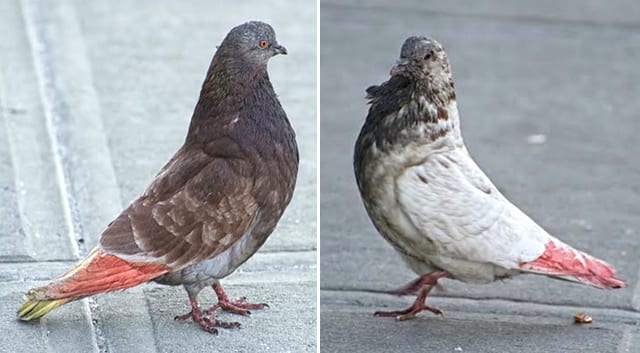
by Pigeon Patrol | Sep 11, 2023 | Bird Netting, Bird Spikes, Doves, history of pigeons, MBCA, pet bird, Pigeon Control
The pigeon problem in Kirkland Lake is so bad, police felt the need to issue a news release this morning warning residents to follow the law when dealing with them.
The town started renting out traps to residents today to capture pigeons, and police say that trappers will be responsible for the disposal of the birds, which includes a ban on throwing them in the garbage for curbside pickup. Successful trappers will instead have to take the pigeons for burial at the town dump.
“The OPP want to inform the residents that it is each individual’s responsibility to educate themselves on this topic and to ensure that they are acting within the laws, regulations and town by-laws,” says Constable Adam Gauthier.
The problem started, says Ashley Bilodeau, Kirkland Lake’s Manager of Planning and Land Development, when a few bird lovers started feeding the pigeons.
“We have a couple of residents that have been obnoxiously feeding pigeons to the point where we have some serious problem areas, so we passed a no-feeding bylaw back in the fall,” she told BayToday. “However, there is one individual who just continues to feed them despite the bylaw and has been charged. There’s been a few charges laid around town but there is one individual who is causing more headaches than normal.”
The fine for feeding is steep at $100, and that’s down from the $250 the town wanted to charge but the province wouldn’t allow it.
“So we’re trying to find different ways to combat the issue because it’s now causing problems to people’s properties and vehicles because there are so many of them.”
Bilodeau says the town has checked with the MNRF and it’s not illegal to kill pigeons although you are required to have a small game licence in order to trap and kill pigeons.
The town has not placed a limit on the number of pigeons people can capture, but police warn folks can’t use their guns to shoot the birds because discharging a firearm is prohibited within the Town of Kirkland Lake,
Bilodeau says poop is the problem.
“They’re also causing damage to buildings by trying to build nesting areas,” she adds. “We’ve got four traps here and people can come in and put in a deposit and take the trap for 10 days, and when they bring it back they get their money back.”
Pigeons were originally bred from the wild rock dove, which naturally inhabits sea-cliffs and mountains according to Wikipedia, so the bird finds the ledges of buildings to be a substitute for sea cliffs.
They have become abundant in towns and cities throughout the world. Due to their abilities to create large amounts of excrement and to carry disease, combined with crop and property damage, pigeons are largely considered a nuisance with steps being taken in many municipalities to lower their numbers or completely eradicate them.
Source
Pigeon Patrol
Pigeon Patrol Products & Services is the leading manufacturer and distributor of bird deterrent (control) products in Canada. Pigeon Patrol products have solved pest bird problems in industrial, commercial, and residential settings since 2000, by using safe and humane bird deterrents with only bird and animal -friendly solutions. At Pigeon Patrol, we manufacture and offer a variety of bird deterrents, ranging from Ultra-flex Bird Spikes with UV protection, Bird Netting, 4-S Bird Gel and the best Ultrasonic and audible sound devices on the market today.
Canada’s top wholesaler for bird deterrent products for twelve consecutive years.
Contact us at 1- 877– 4– NO-BIRD, (604) 585-9279 or visit our website at https://www.pigeonpatrol.ca/
Bird Gone, Pigeon Gone, Pigeon problems, pigeon spikes, 1-877-4NO-BIRD, 4-S Gel, Bird Control, Pigeon Control, bird repellent, Bird Spikes, sonic bird repellent, stainless steel bird spikes, bird spikes Vancouver, Ultra Sonic Bird Control, Bird Netting, Plastic Bird Spikes, Canada bird spike deterrents, Pigeon Pests, B Gone Pigeon, Pigeon Patrol, pest controller, pest control operator, pest control technician, Pigeon Control Products, humane pigeon spikes, pigeon deterrents, pigeon traps, Pigeon repellents, Sound & Laser Deterrents, wildlife control, raccoon, skunk, squirrel deterrent, De-Fence Spikes, Dragons Den, Pigeon, Pigeon Patrol, Pigeons Roosting, Vancouver Pigeon Control, Bird Spikes, Bird Control, Bird Deterrent, Pigeon Deterrent, Surrey Pigeon Control, Pest, Seagull deterrent Vancouver Pigeon Blog, Birds Inside Home De-fence, Pigeon Nesting, Bird Droppings, Pigeon Dropping, woodpecker control, Keep The Birds Away, Birds/rats, seagull, pigeon, woodpecker, dove, sparrow, pidgeon control, pidgeon problem, pidgeon control, flying rats, pigeon Problems, bird netting, bird gel, bird spray, bird nails, bird guard, Pigeon control, Bird deterrents, Pigeon deterrents, Bird control, solutions, Pigeon prevention, Pigeon repellent, Bird proofing, Pest bird management, Pigeon spikes, Bird netting, Humane bird control, Bird exclusion, Urban bird control, Anti-roosting devices, Pigeon removal, Bird barriers
y/bird nails/bird guard
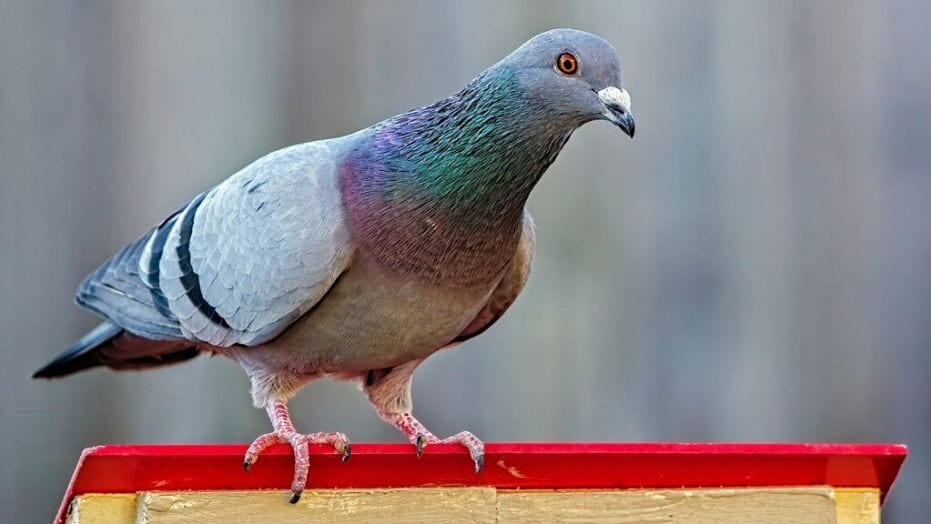
by Pigeon Patrol | Sep 7, 2023 | history of pigeons, MBCA, pet bird, Pigeon Control, Pigeon Droppings, Pigeon Patrol's Services, Pigeon Predators
We all are well aware of the fact that how films, web series, and TV serials have romanticized the idea of symbolizing birds such as pigeons and sparrows as a symbol of love and peace. However, the truth is completely different from what we see on the screen. If these birds become unpaid tenants of your little balcony, you are surely going to encounter the nuisance they create. Thus, many homeowners opt for Sparrow Netting or Pigeon Netting to keep them at bay.
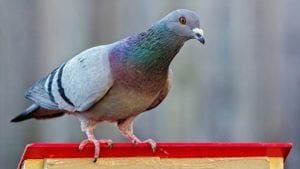
In addition, during the summer season, it becomes extremely important to place pigeon netting for balconies to get rid of all the chaos they bring with them. You may wonder how these little pests can cause substantial damage to your family’s health and also to your property. Well, they can and that is the reason why various residential and industrial spaces in rural and urban areas rely on anti bird netting services.
With that being said, this write-up is specially dedicated to discussing why anti bird netting becomes crucial during the Indian summer season. The comprehensive guide will also shed some light on the key features of HiCare’s bird netting in Pune, Mumbai, and other Indian cities.
Birds are Dirty Beings
Yes, believe it or not, they are. And, if you don’t you can check out the surface of a car parking in the open space or benches of the park. Now, just imagine that a bunch of birds are enjoying the shade under your balcony. Once they leave, you are likely to spot their droppings. It is a treat for all the balcony gardeners as a large amount of their dropping can harm vegetation.
Birds Can Cause Illness
Diseases such as pigeon ornithosis, encephalitis, and salmonella food poisoning have all been linked to pigeons. However, determining the true incidence of illness transmission from pigeons to humans is problematic. Disease outbreaks that may be traced back to pigeon flocks are uncommon. Hence, another strong reason for subscribing to bird netting in Pune, Mumbai, or any other metropolitan city of India.
Pigeon excrement contains the causal agent of histoplasmosis, a systemic fungal illness that affects the human respiratory tract if allowed to accumulate for several years. Histoplasmosis can be lethal in extreme cases. Pigeons’ external parasites include a variety of mites, fleas, ticks, and bugs.
More than anything else, pigeons can be a threat to human safety. Thus, the elimination of feeding, watering, roosting, and nesting sites is important during summer, winter, or any Indian season. As birds pose serious concerns to gardeners and property owners, bird netting services can act as a barrier to letting them in your sweet home. With that being said, here are four benefits of Bird Netting installation in summer. Scroll down to take a brief look at each!
Top 4 Benefits of Bird Netting
- Long-Term Protection
- Durable and Sturdy
- Cost-Effective
- Simple to Use
- Disease Prevention
- Environmentally Friendly
- Low Maintenance
1. Long-Term Protection
During summer, birds often come in their numbers to attack your balcony causing significant damage to the surroundings. To counter this, the net is an effective way to offer the right protection to complete your space from bird damage.
2. Durable and Sturdy
Nets are made of the strongest, highest-quality materials, come in a variety of shapes and sizes, and are UV-stabilized. Some nets have been estimated to last up to several years. Anti-bird netting pays off in terms of durability, which is important in any worthwhile investment. The setup is basic and straightforward.
3. Cost-Effective
Nets are made of the strongest, highest-quality materials, come in a variety of shapes and sizes, and are UV-stabilized. Some nets have been estimated to last up to several years. Anti-bird netting pays off in terms of durability, which is essential in any worthwhile investment.
4. Simple to Use
The netting is exceptionally simple to use and easy to install. The process is hassle-free and professionals can do it within a given timeframe. Once installed properly, it does not require any external force to come into action.
Many reasons and benefits can lure more homeowners to install pigeon netting for balconies. However, finding the best professionals that give Bird Netting Services in Mumbai or any Indian city could be a bit difficult. On the flip side, it is not impossible either. If your browser history is filled with the query – Bird Netting Mumbai, HiCare has a solution for you.
5. Disease Prevention
Bird droppings can contain harmful pathogens and bacteria. By keeping birds away from areas where people live and work, bird netting reduces the risk of diseases transmitted through contact with bird droppings. This is especially crucial in urban environments.
6. Environmentally Friendly
Bird netting is considered an environmentally friendly bird control method because it does not harm the birds. Instead, it provides a physical barrier that discourages birds from accessing certain areas without causing them harm. This makes it a humane and sustainable solution.
7. Low Maintenance
Once bird netting is properly installed, it requires minimal maintenance. Routine inspections to check for damage and repairs as needed are typically the only maintenance tasks required. This saves time and effort compared to other bird control methods.
Source
Pigeon Patrol Products & Services is the leading manufacturer and distributor or bird deterrent (control) products in Canada. Pigeon Patrol products have solved pest bird problems in industrial, commercial, and residential settings since 2000, by using safe and humane bird
deterrents with only bird and animal friendly solutions. At Pigeon Patrol, we manufacture and offer a variety of bird deterrents, ranging from Ultra-flex Bird Spikes with UV protection, Bird Netting, 4-S Bird Gel and the best Ultrasonic and audible sound devices on the market today.
Voted Best Canadian wholesaler for Bird Deterrent products ten years in a row.
Contact us at 1 877-4-NO-BIRD,(604) 585-9279 or visit our website at www.pigeonpatrol.ca
Pigeon/Pigeon Patrol / Pigeons Roosing / Vancouver Pigeon Control / Bird Spikes / Bird Control / Bird Deterrent / PIgeon Deterrent / Surrey Pigeon Control / Pest / Seagull deterrent / Vancouver Pigeon Blog / Birds Inside Home / Pigeons in the cities / Ice Pigeons / What to do about pigeons / sparrows, Damage by Sparrows, How to Keep Raccoons Away, Why Are Raccoons Considered Pests / De-fence / Pigeon Nesting / Bird Droppings / Pigeon Dropping / woodpecker control / Professional Bird Control Company / Keep The Birds Away / Birds/rats/seagull/pigeon/woodpecker/dove/sparrow/pidgeon control/pidgeon problem/pidgeon control/flying rats/pigeon problems/ bird netting/bird gel/bird spray/bird nails/bird guard

